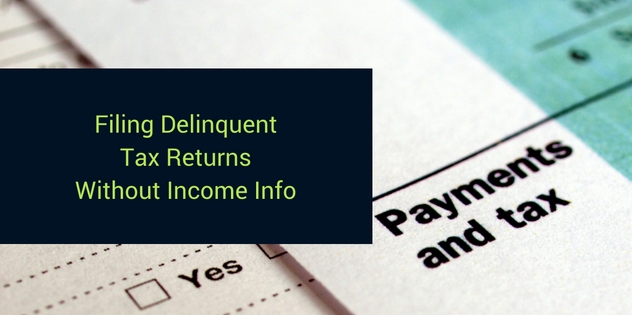How to File Delinquent Tax Returns without Income Info
People often come to our Massachusetts tax resolution office to resolve their tax problems, such as filing many years of delinquent tax returns. Unfortunately, they sometimes lack the necessary information to prepare their returns. Thankfully, we know how to navigate the IRS maze and get our clients back on track. This video, “IRS Tax Problem Resolution”, explains how we gather the missing information needed to prepare and file their original tax returns and bring them back into compliance, often saving them money too. Below are the main points of interest:
If a client is missing W-2s or 1099 statements for interest, dividends, the sale of stock, or 401k or retirement plan distributions from previous years for example, we can generally get 95% of the taxpayer’s income information from the IRS. We can also sometimes go to other outside third parties to get it. Here are four steps we take to gather the missing pieces of the puzzle:
- We file a power of attorney with the IRS to find out which year’s tax returns were filed and which were not.
- We request income transcripts from the IRS for any of years with no tax return on file.
- Since the IRS income transcripts do not contain state tax withholding information, we often contact current and previous employers’ payroll departments or their outside payroll service to get copies of the W-2s or payroll ledger printouts showing the state tax withholding data.
- For business owners who have no bank statements or canceled checks, we can request copies of those documents from their bank. Generally, banks will keep information up to 5 or 6 years. If the bank no longer has the records, we can often use forensic methods and business ratios to reconstruct the business’ income and expenses using whatever business and personal records the client does have.
NOTE: It is always better to file your own original tax returns, even if imperfect, than let the IRS assess substitute tax returns, since the IRS will almost always over-inflate the amount of tax owed.
People often ask how far back they will need to file their taxes. If the IRS has not assessed anything, generally you only need to go back and file the last six years of tax returns, even if you haven’t filed in 7 or 10 or 20 years or more.
IMPORTANT NOTE: There are exceptions to this. So check with a licensed tax resolution specialist for specifics in your case. Another point that people often overlook is regarding refunds. A tax return must be filed in order to receive a refund. You have three years from the original due date, including extensions, or two years after the date the money was paid to claim a refund. After that you forfeit your refund.
The bottom line is this: Filing a reasonably accurate yet imperfect return is much more advantageous to the taxpayer than having the IRS file one for you. It almost never will be in your favor and will generally have you owing more taxes AND you may be entitled to a refund!
It’s never too late to come out from the shadows and file a tax return. Get help from our qualified Massachusetts tax resolution professionals who can help you gather the information needed to file and take that heavy weight off your shoulders. Don’t worry about what information you are missing – contact us right away! We can help you!
IRS Problem Resolution: Filing with Incomplete Information
Massachusetts Tax Resolution Expert Matthew Previte CPA PC discusses how to file when you don’t have all of your tax information available.

Follow Us!